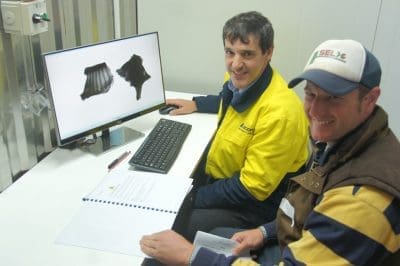BEEF carcase scanning for meat yield using the DEXA scanning technology will get underway at the Teys Australia Lakes Creek trial site in Central Queensland in coming weeks, following the installation of more equipment during the Christmas/New Year plant closure period.

A Scott Technologies staffmember points out features from a DEXA scan of a beef quarter during a southern NSW technology demonstration.
Once DEXA scanning commences, sometime after February Teys will then start making yield comparisons between DEXA’s estimates and physical bone-outs of at least a couple of hundred scanned carcases, to gauge the system’s predictive capacity, and helping validate the technology.
This will be a painstaking and costly process, likely to be carried out outside normal plant working hours, and effectively turning many of each carcase’s primal cuts into ‘mince.’
As part of the DEXA trial project at Lakes Creek, Teys also plans to benchmark the system’s yield prediction performance against a range of other emerging carcase yield assessment technologies.
These include a German-made E&V yield camera which promises to provide fast and accurate carcase yield assessment, without some of the cost and infrastructure downsides that DEXA presents.
One of DEXA’s drawbacks is that it takes up 60 square metres of space in the plant, and requires sophisticated protection systems to prevent human exposure to X-ray radiation. Some of the other yield technologies take up next to no space, and present nil human health risk.
Another yield system to be examined is a German fish-eye camera-based technology used to capture three-dimensional images, from which yield may be able to be calculated. The advantage of this system is that it is a relatively inexpensive piece of technology which does not require costly installation.
This work means that DEXA still has to ‘prove itself’ as the best available option, from a range of commercial perspectives, before it is adopted for wider installation. For example in some abattoir applications, it may be more cost-effective to install a much cheaper, simpler objective yield assessment system that delivers 80 percent accuracy in yield prediction, than installing a $2 million DEXA system that delivers 90pc accuracy, Beef Central was told.
Longer term, it is hoped that DEXA will also provide guidance over yields from individual cuts, as well as overall carcase yield.
Quality assesment, as well as yield
During the detailed bone-out function being carried out for comparisons against DEXA on yield, Teys plans to also collect quality attributes, for comparison against objective quality grading technologies including a second E&V camera designed for quality grading, currently in use in the US beef industry; the Kuchida quality grading camera from Japan; and a third camera technology in use in the US called TenderSpec, using hyperspectral imaging.
The data-set provided by the detailed bone-out work may also be used for comparison with live animal yield assessment technologies now starting to appear.
What this all means is that the Lakes Creek trial project originally directed at assessment of DEXA will now go well beyond scrutiny of this single technology, to a broader assessment of a range of yield and quality assessment tools that might have application in the Australian beef industry.
Technology company Scott is likely to hand-over the Lakes Creek DEXA system to Teys around the end of February with a working yield algorithm, for commercial trial carcase scanning work to start. Scott will continue to be involved in the trial process after that date.
Teys Australia is hoping to start providing ‘meaningful yield feedback’ from DEXA’s carcase readings to some Lakes Creek cattle suppliers by the Beef 2018 event in May, and the longer-term aim is to run every carcase passing through the plant through the DEXA scanner – potentially up to 1600 head per day, depending on this year’s cattle supply.
The Beef 2018 event in May will provide an opportunity to help start breaking-down some of the mysteries surrounding objective carcase assessment technology with producers.

MLA AGM, 2016 proudly announced MLA’s plans objective carcass measurements were told that Ausmeat had 845 graders and their wages bill was between 50,000 and $100,000 a year could mean a total bill of $45-$80 million., However it seems that company graders will remain after the installation of Dexa, which will measure fat, bone and saleable meat.. The idea was all machines will be installed throughout all Ausmeats plants at the same time so is everybody be working on the same system from the top of Australia right through the Tasmania. The total cost of installing these machines would be $150 million dollars to be be paid for by the MLA. At the time ABA suggested that we get one plant up and running in a works and then kick it to death and knock all the kinks out and then and only then, the industry should consider spending huge amounts of money. Both CCA and MLA continue to claim Dexa machines had been working throughout Australia over the last three years in beef processing, my information suggests this is clearly wrong and the latest announcement seems to suggest that this is the case. Now we are hear in 2018 and sometime after February Teys will start comparisons between Dexa and other emerging carcass yield assessment technologies. It appears these technologies may be cheaper and not take up the large amount of space required for Dexa 60 m². Surely if this system is not going to be used questions should be asked of MLA and Cattle Council why they rushed in where angels fear to tread. And why a report suggested that the return would be $434 in the first year.